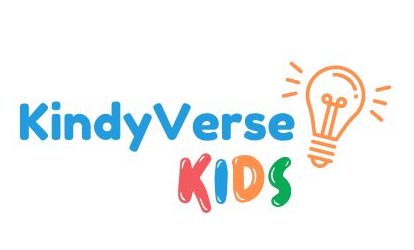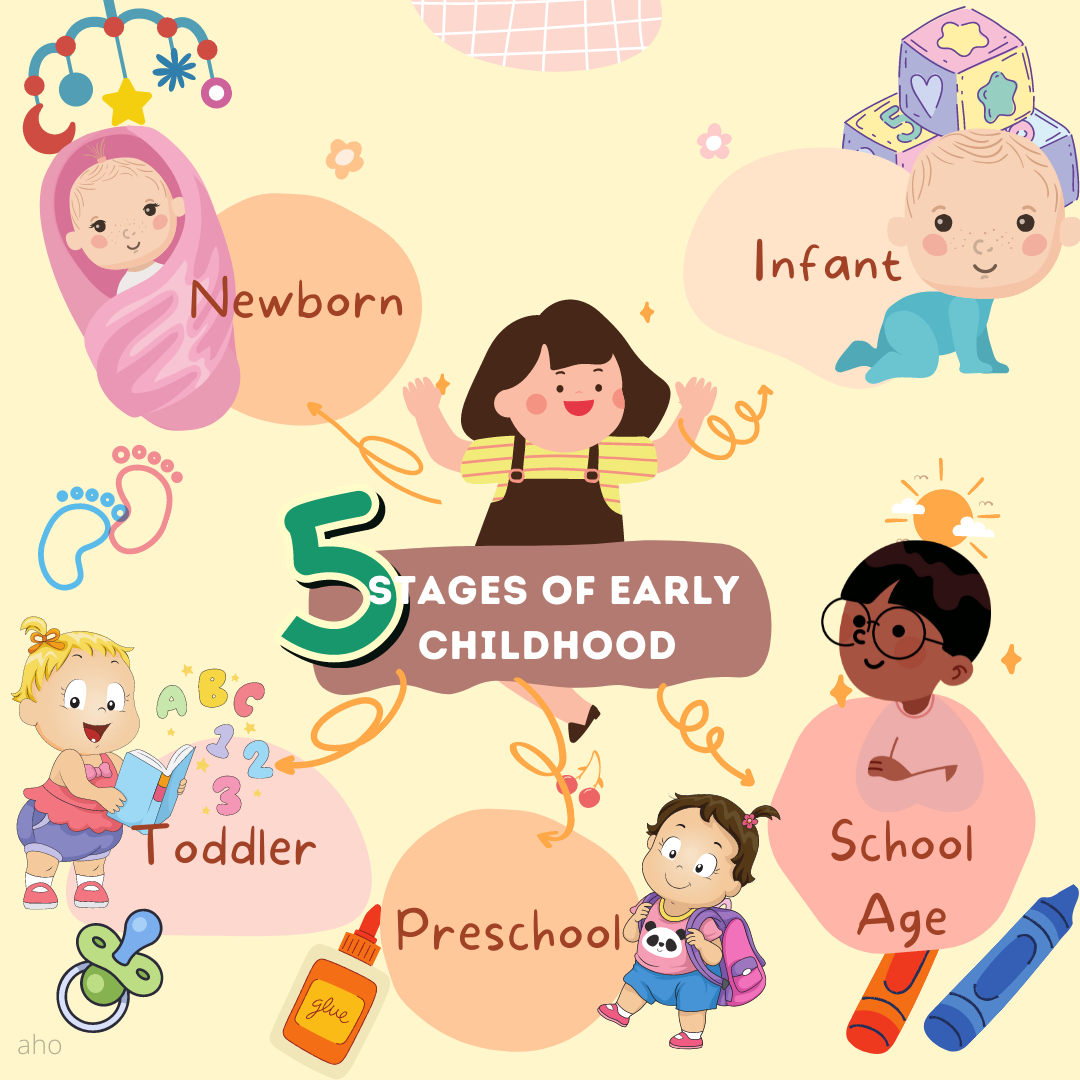
5 Stages of Early Childhood Development Milestones
The 5 Stages of Early Childhood Development are the processes or phases of a child’s growth between 0 months old and up to 5 years old. Every stage is observed to include a child’s growth in physical, emotional, cognitive, and social aspects.
In this section, the 5 stages of early childhood development are identified as newborn, infant, toddler, preschool, and school-age. These stages are categorized based on the capabilities of the child to react, learn, or connect to their environment.
Like all other milestones, keep in mind that typical development can take between six and eight months. This implies that students may demonstrate skills six to eight months before or after the age indicated.
1. Newborn
During the first 3 months after the child is born, they already know how to make small moves. Newborn gestures and sounds are signals to communicate with their attendant, like crying when they are hungry, something painful or itchy in their body, or just when they feel discomfort. They are also tilting or facing their heads left and right, moving their hands and feet because they are starting to learn to move them. Little by little, they are recognizing objects near them, and they get reactive when they hear something loud. In the 3rd month, they learn how to smile.
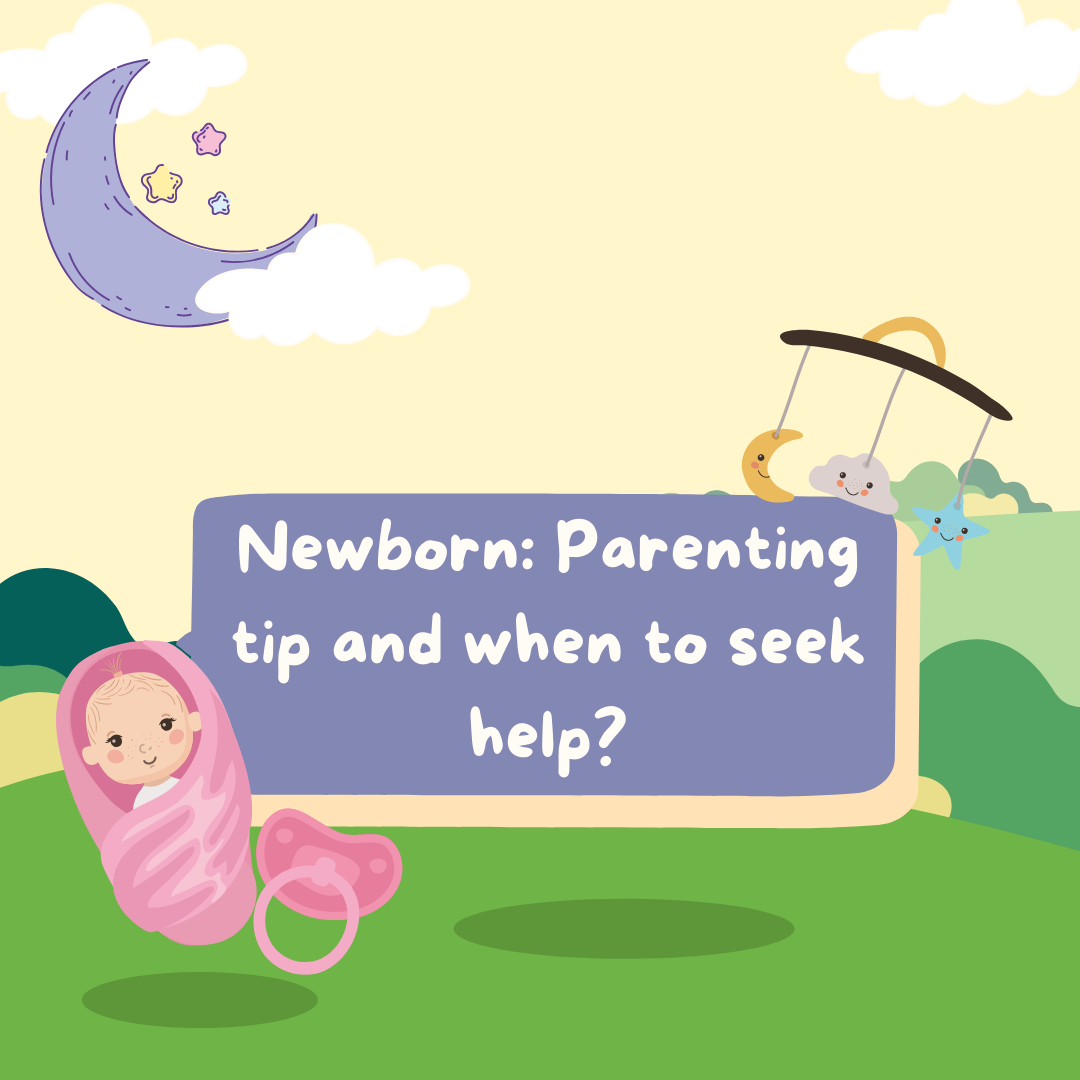
Parenting Tip: How to Support Your Child During the Newborn Stage
This stage is the most crucial and difficult in taking care of a baby. Most of the caregivers, especially the moms, do lack sleep since a baby needs to be fed from time to time or change their diapers before it leaks everywhere. But during your awake hours, you can try doing the following to bond with your baby:
- You can tell stories, talk, count their body parts, or tickle them. This can help them be able to use their senses.
- You can make funny or cute faces to make them laugh or smile. Always show your smiling face and laugh.
- For starters, you can now give them soft and baby-safe objects with texture to touch or feel. You can also take them outside to feel the sun, the air, the breeze and the environment. It could heighten their senses.
- Give your tummy time for a few minutes a day. Lay your baby on the bed facing the bed. In this way, you are giving them time to be on their own.
When To Seek Help for Your Newborn?
When a newborn is in pain or uncomfortable, he or she is unable to communicate. It is critical that you remain vigilant and properly attend to their needs at all times. By means of observation, seek help from your doctor when you notice the following:
- Trouble breathing. Check their mouth or lips to see if they are turning blue or if they are breathing rapidly, like 60 breaths per minute.
- A rectal temperature of 38 degrees Celsius or higher is required.
- Seizure
- blood in their vomit or vomiting forcefully.
- has yellowish skin and eyes or signs of jaundice.
- Diarrhea
- Sleeping more than usual,
- He refuses to eat or to be fed.
- Caught a cold
- Rashes or infections that won’t go away on their own.
- Anything unusual with your baby’s body, eating, sleeping, habits, appearance, or any other signs that are bothersome?
2. Infant
This stage covers the first 3 months to 1 year of a child’s life. After the first developmental stage, you will notice a significant change in a child’s behavior and capability to interact.
3rd Month
The child is practicing her movements, trying to learn about their surroundings and learning to react to the people around them. They gain senses so they begin to get curious and work their intuition. Little by little, they practice hand and eye coordination.
6th Month
The child is able to say “words” like “dada” or “mama”. They started to babble a lot, trying to talk or copy what they heard or answered. Their body strength is showing; they are getting a hold of making their bodies work or move and have started using them to explore and be in different poses. And, as their visual sense develops, they begin to understand or become acquainted with the people around them, the environment, objects, and images.
9th Month
They are now able to speak a word. From palm grasp, they now learn how to pincer grasp. Mostly, they do this when they see something small, either moving or with texture. Their ability to comprehend and their intuition are being practiced as they learn fast by just observing and exploring objects. They also gain affinity and bond with their caregivers and parents. That’s why they also start to seek attention.
12 Month
At this age, a child has a concrete familiarity with the people surrounding them and their environment. And since a child has now gained a bond with the parents, they become clingy, so they cry to see them leave. Because of repetitive experience, trust and security develop, and they are now able to understand instructions and do a little tasks.

Parenting Tip: How to Support Your Child During Infant Stage?
Exerting effort or being able to do all the caregiving hands-on is a very helpful way to make the developmental process or nurturing faster. At this stage, infants should be able to have direct interactions with their caregivers. The following are the tasks you can try doing with your baby:
· Talk to the baby, but don’t use baby talk. This will help them learn to speak words faster.
· When they are babbling or mumbling, answer them. Always talk back in the most careful and motherly way. Like, guide their talking with real words.
· Play classical music or soothing music for relaxation. Better yet, sing to your baby. It helps them to be comfortable and at ease.
· Read to your baby.
· Spend the majority of your time providing warmth. Holding, cuddling, and caring for your child.
· As you devote your full attention to parenting your baby, offer reassuring words or promises from time to time.
· When the mood is light and the baby is alert and active, Try playing with them. Like simple peek-a-boo or anything that would make them laugh or get out of stress.
When To Seek Help for Your Infant?
Infants are unable to communicate or even express themselves when they are in pain or uncomfortable. It is critical that you remain vigilant and properly attend to their needs at all times. By means of observation, seek help from your doctor when you notice the following:
· Skull fracture
· Fever of 38 degrees Celsius or above for more than 3 days.
· He refuses to eat or to be fed.
· Caught a cold
· Vomiting and diarrhea
· trouble breathing.
· poisoning
· Visible bluish or grayish lips
· Dehydration
· Rashes or infections that won’t go away on their own.
· Anything unusual with your baby’s body, eating, sleeping, habits, appearance, or any other signs that are bothersome?
3. Toddler
A toddler is the 3rd early childhood developmental stage, with a range of 1 to 3 years old. Their entire learning or development process happens through play. Play-based learning is a very effective method of learning for early childhood. Habitual activities such as reading, singing, talking, and playing games start here. With further practice, they master these activities, and it’s really fascinating how they grow so fast and improve their well-being.
The following are the developmental milestones and their examples:
· Sight, touch, smell, hear, and taste are examples of sensory experiences.
· Gross motor skills: climbing, walking, running
· Fine motor-feeding themselves, drawing, scribbling
· Language Development-saying single to a few words, then sentences
· Interaction and play with other children or adults, taking turns, child play, or fantasy play are all examples of social and emotional development.
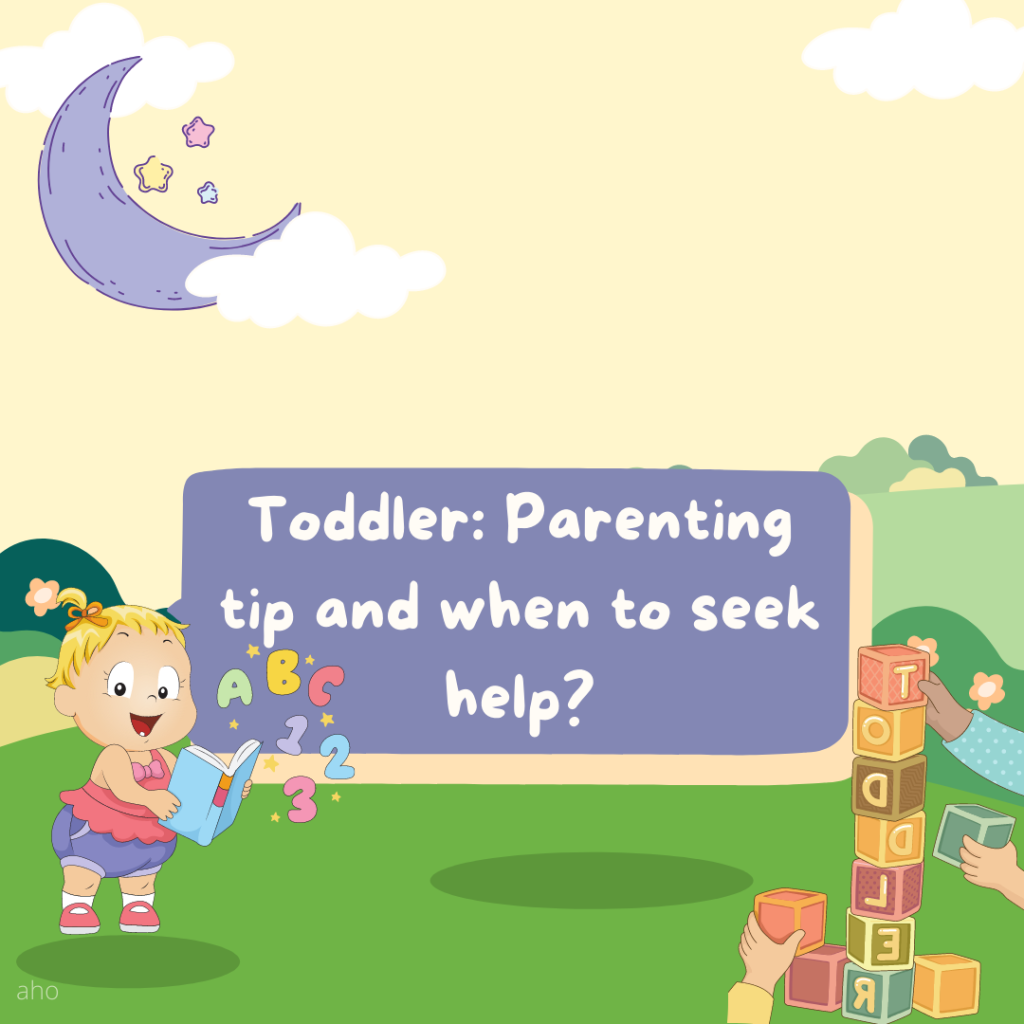
Parenting Tip: How to Support Your Child During Toddler Stage?
At this stage, you will clearly see the kid’s capacity to think and his capabilities to do basic activities such as playing games, writing, naming things, or adaptability grow exponentially. To help them nurture their present skills as of now, you can try to do the following:
- Play with them. Play games appropriate for their age, like outdoor games or sports.
- Help them be creative. You can help them create something from scratch. You can use molding clay, Lego blocks, jigsaw puzzles, etc.
- From time to time, get them to read short stories with you. Read and elaborate.
- The ability of a child to learn is not instantaneous; therefore, learn to be patient and allow them to discover things on their own, but under adult supervision.
- Support them when they have found what they really like, but also teach them hard work and patience.
When To Seek Help?
Toddlers don’t grow and develop all their skills and phases at the same time. Your child may seem to be ahead and some may have a delay, which is normal. Children have their own pace of development. Talk to your child’s doctor if you see any of the following signs:
- Inability to walk.
- Speaking only a few words
- Not understanding simple requests, directions, or instructions
- not being affectionate.
- Disinterest in socializing or meeting people.
- Not showing interest in anything.
- Not being vocal about their needs.
4. Preschool
This stage is the best for developing the motor skills of the child. Motor skills are functions that involve bodily movement to do physical activities or tasks. At this stage, we are talking about developing and enhancing the gross motor skills and fine motor skills of children between 3 and 5 years old.
Gross Motor Capabilities
Gross motor skills are activities that require a larger mass of muscles to perform tasks. Since this means movement of large muscles, it involves moving the limbs and trunk. Usually, the task can be done by balance control and posture.
The following are the gross motor skills and activities:
· Running
· Walking
· Skipping and hopping
· Jumping
· Pedaling and steering while riding a bicycle or tricycle
· Climbing ladders, chairs, beds, or stairs
· Throwing and catching a ball
· Kicking in
· Galloping or leaping
· Stretching hands when reaching for something
· Dressing up or removing the clothes
Fine Motor Abilities
Fine motor skills are activities that require smaller-mass muscles to perform tasks. Fine motor skills are good for tasks that require precision or control of smaller muscles. Small muscles need to be refined, as do gross motor skills.
The following are fine motor skills activities:
· Pinching or picking up small or thin things using the index finger and the thumb
· Gripping
· Zipping and unzipping a zipper or zip-lock bag
· Tying and untying laces or ribbons.
· Stacking small objects (blocks, Lego, or toys)
· Cutting using scissors
· Using tweezers
· Molding clay to make shapes, lines, or letters
· Following the pattern
· By completing several puzzles
· Writing their name or another person’s name
· Scribbling or drawing objects like shapes, flowers, vehicles, animals, or things they see in their homes.
· They are brushing their teeth
· paging through the book
To understand your child’s developmental milestones better, the table provides information about the activities or phases, at what age they occur, and their interpretations.
2 to 3 Years
At this stage, the kids start to be creative and imaginative. Their cognitive capacities show how they perform tasks or activities. They are also starting to learn basic colors, the difference between “1” and “2”, get more inclined to picture stories, start to feel for people, recognize their family and people around them.
3 to 4 Years
This age shows how kids try to do things on their own and try to help their family members do house chores. They also start to be engaged in playing games with other people because, at this stage, they are also learning to get familiar with the environment they are in. All in all, you will see significant changes in their vocabulary, cognitive capacities, and physical capabilities to do activities and be somewhere they want to be. They act freely, have fun, and are careless.
4 to 5 Years
You will see a significant change from the previous stage (toddler) and to this stage (preschool) and their ability to comprehend and focus on what they are doing is noticeable when taught thoroughly and made very engaging. It’s easy to make them do things like give instructions more and more. Occasionally, you can promise rewards after teaching. You’ll see their efforts, their very capacity and capabilities. They start being obedient, learning to ask permission first before doing something, and show courtesy.
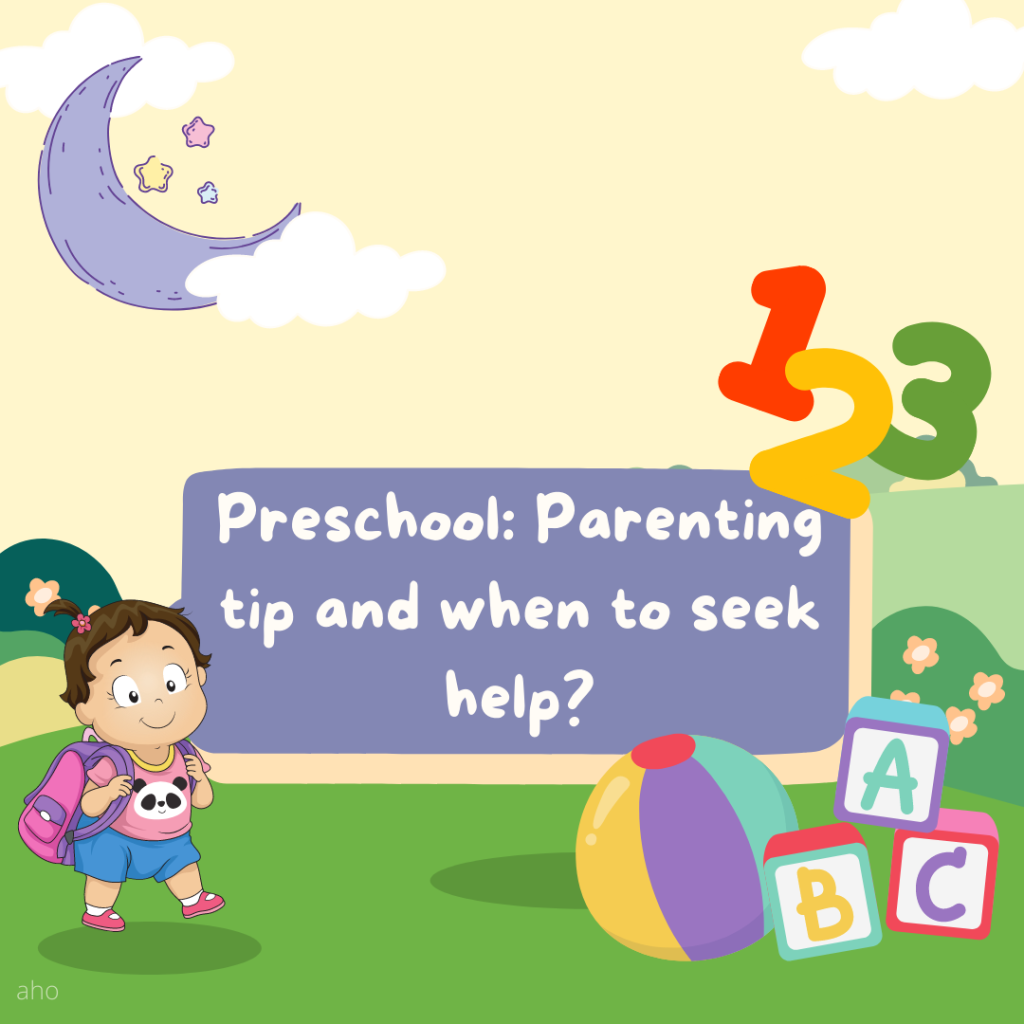
Parenting Tip: How to Support Your Child During Preschool Stage?
In order to support your child to meet their developmental needs at this stage or age, the best way to nurture your child in every aspect is to enroll them in daycare centers. Most children at this age know the basics of writing, drawing, coloring, counting, socializing, following instruction, courtesy, and asking.
The following are the things you can do to help them:
- Enroll them in a music class to improve their memory and sense of hearing.
- Engage them in physical activities such as teaching them to play ball, enrolling them in a sports class or training, playing outside with other kids, or playing with them.
- Prepare learning materials and books to read whenever they have free time or are in the mood to do so.
- Observe critically how your kid behaves alone and with other kids. Don’t overlook it.
- To give holistic care for their developmental needs, it is recommended to enroll your kid in a daycare center.
- Always have family time. Go out together and eat together.
- Let them play when they want to play. Teaching them should not be forced. Play-based learning helps to improve their attention to learning.
When to Seek Help?
Since the preschool stage is in between the ages of 3 and 5, it will be less problematic for your child’s problems since they can already talk about them, unlike the previous stages. The only difference at this stage is to check their psychological issues.
The following are some of the issues:
- Speech delays
- ADHD (Attention-deficit/hyperactivity disorder)
- Aggressive behavior (throwing and breaking things, hurting others, picking fights)
- Cruelty towards animals (tormenting and lashing family pets or small living things)
- Evident to have an imaginary friend (bogus friend)
- uncooperative with the developmental process, and needs that do not change
- Inflicting self-harm
- Making immoral comments
- Showing signs that aren’t normal physically and mentally
5. School-Age
The school age stage, ranging in age from 5 to 12 years old, will have a vast range in their physical and cognitive development. Unlike the previous stages, where most children learn from their parents/guardians or their environment, this entire stage focuses on developmental stages now that they are attending school. Attending school can impact a child’s ability to get stronger physically, improve cognitive capacity, gain more knowledge, and dwell on their emotions as they are exposed to different situations or scenarios every day.
Influences and Factors Affecting School-Age Growth
Numerous external factors and impacts can have an effect on a child’s development. It is critical to be aware of these factors and influences and to keep in mind that each child develops at their own pace. The major factors affecting the development of school-aged children are as follows:
Living and Learning in a Positive Environment: Both at home and at school, where one feels valued, loved, and challenged, will help facilitate favorable growth and self-esteem. Pollution and a lack of cleanliness, for example, can have a detrimental effect on a child’s physical development.
Culture: A child’s culture is likely to be a significant element in their overall development. For instance, a family’s culture or religious beliefs can have an effect on a child’s nutrition, activities, and daily routines.
Nutrition: Malnutrition happens when a child’s diet is deficient in certain nutrients or is excessive in others. A child who really doesn’t obtain adequate nutrients may experience underdeveloped or delayed growth. A child who consumes an excessive amount of a particular nutrient or food type may be at risk of obesity. Both types of malnutrition increase the risk of developing additional diseases and disorders.
Genetics: Specific physical characteristics, such as height and body build, can be inherited from one’s family. Genetics can also play a role in the onset of puberty and developmental milestones, as well as in the development of specific diseases, disorders, and disabilities.
Socioeconomics: A family’s financial situation can have an impact on the types of food available and the types of activities in which a child can participate. Families experiencing financial difficulties may also be unable to supply adequate medical care.
5 Years
From newborn to this stage, it is evident that the developmental process is really fast in the first 5 years. Compared with adults who got older by 5 years, adults grew because of maturity and dreaming. Unlike the prior, growth from this age is to explore and to be guided to be a better citizen. That’s why nurturing their body, mind, and emotions while they are young is very important.
6 to 8 Years
At this age, you will notice that a child is growing more and more independent. Compared to the previous stages, they are becoming self-reliant and tend to prove themselves capable of things on their own. They are starting to form bonds with their friends, like for boys, going biking, skating, playing ball; and for girls, playing dolls, princess plays, cooking, and playing house. The most important thing at this age and stage is to observe your child’s emotions and mental health. It is common for them at this age to want attention, acceptance, freedom, to be selfish, and to be irrational because their emotions and understandings are not tough enough, unlike adults. This requires a lot of patience.
9 to 12 Years
When a child reaches this age with the help and support of their guardians, you will see from the child’s behavior the results of your effort and hard work. They are starting to gain hobbies like reading, playing instruments, writing, playing sports, and making art and crafts. Girls and boys hit puberty and their bodies begin to mature, as well as their reproductive systems, so they start to be self-conscious. They now know how to keep secrets from their parents or guardians and have started having crushes. The desire to be in a social circle could be easier or harder depending on the child’s behavior or appearance. It is common but not tolerated. Either way, understanding may be very difficult for oppressed children, so the help of their parents or guardians is a must.
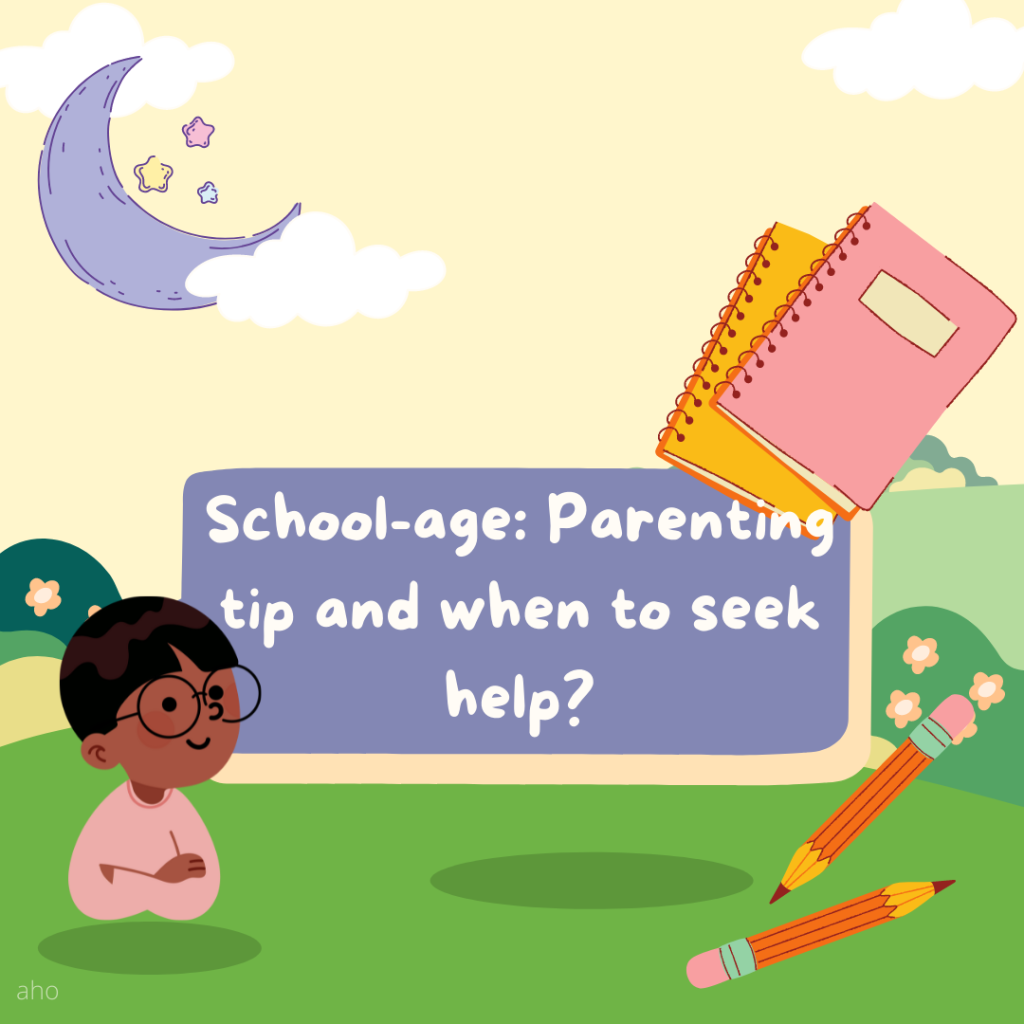
Parenting Tip: How to Support Your Child at School Age?
This could be the most challenging stage of your children’s early childhood lives. They are facing big changes from how they once did, reacted, and felt. At this stage, they may have seen changes in their bodies and feel more emotions than ever.
To help them more with these changes, here’s what you can do:
- Talk to your child about the changes that could happen to them (especially what happens when they reach puberty).
- Observe their moods and emotions. You should know what’s wrong with your kid, and when you do, take action. At least take them somewhere peaceful or somewhere that would lift their mood.
- Encourage them to join clubs or sports teams. In this way, they can make a lot of friends with similar interests.
- Set rules about what they can do and what they can’t do when they are allowed to go outside without adult supervision. Make them respect it.
- Try not to be upset if you decide to punish your child and give them the impression that they are free to express or explain themselves.
- You can now oblige your child to do household chores or at least clean their belongings.
- Set limitations on using gadgets and make them involved in recreational activities or something you can do as a family.
When to Seek Help?
There’s a lot of risk for your child when they reach this age or stage. Children, boys and girls, experience aloofness towards people, sometimes making them look like the odd one. Kids at this age can only be kind and sweet or bad and rouge. You will never know what happens to your child when they go to school, so take action when you notice something like:
- Prefers to be alone.
- appears sad or depressed
- Fear of going to school
- seem to have traumatic experiences when encountering something.
- Being caught with a substance
- involves harassment, criminal acts, and abuse.
- doing something unusual for their age.
- Getting stubborn and swayed by peer pressure.
Conclusion
- According to some research, to ensure a healthy child’s growth, parents should observe this in their first ten years.
- Early childhood development and milestones have five stages. These are newborn, infant, toddler, preschool, and school-age.
- Investing and ensuring your child’s early childhood development will give good feedback to society.
